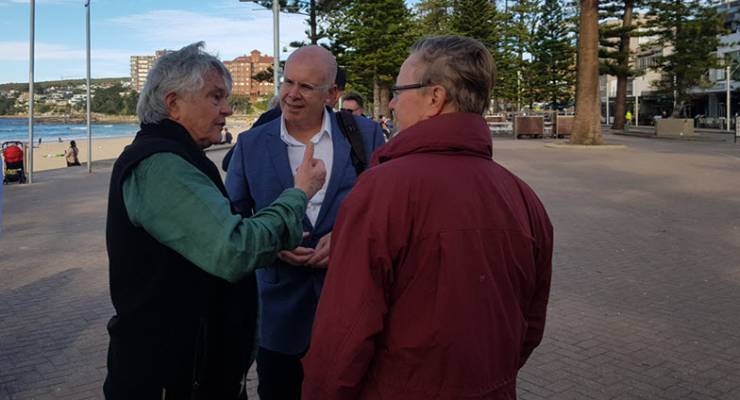
I rush directly from Tony Abbott’s mall meet and greet with John Howard to meet Dean Harris, Labor’s candidate for Warringah. He, along with the Greens’ Kristyn Glanville and independent Zali Steggall, are there on the Corso, addressing the local chapter of Friends of the ABC, who are arranged in a little grey horseshoe. (Even by the standards of a Warringah protest, this is a mature crowd.)
It’s yet another event that Tony Abbott simply can’t turn up to, even if he wanted to. His point-blank promise to not cut funding to the ABC, only to do so within a year of being elected, is up there with the knighting of Prince Phillip as totemic of his weird reign. Yet another policy where Abbott’s critics see him as equal parts callous, dishonest and, in casting the ABC as a hive of anti-Australian lefties, needlessly ideological.
Firstly, I cannot emphasise enough, it is a delight listening to Harris talk.
“Three hundred million dollars in cuts. One thousand jobs cut …” he mournfully observes of the Liberal Party’s time in charge of the national broadcaster, wielding his voice like a musical instrument.
But his steely control almost counts against him at these events: Glanville has a nervy rabble-rouser quality — “Now more than ever, we need a good, excuse my French, bullshit detector like the ABC,” she says, which gets a big cheer. And Steggall, hand in pocket, establishes that “just between the two of us” vibe. “It’s probably how I finished my law degree, having Play School to distract the kids,” she says, which gets a ripple of warm laughter.
Harris, on the other hand, is an audio-book of the Labor policy pitch — a compelling speaker, but is so relentlessly on message, so policy-focused that you can feel the energy start to drain from crowds who have been hepped up on big, personal, unequivocal statements.
This is not really Harris’ fault. Considering Labor’s prospects federally (expected to win an increasingly tight race) and the party’s prospects in Warringah (never come close in 97 years), Labor needs a disciplined candidate who knows the lines and sticks to them. The last thing Shorten needs in the last few weeks of the campaign is a day fending off questions because a candidate in an unwinnable seat says something weird, or offensive, or just contrary to the party line.
In a campaign that has featured a comical number of candidates dropped and a shockingly partisan, meanspirited and personal — even by News Corp standards — focus on Bill Shorten, it’s tough to fault Harris’ approach.
“I said from day one I wanted to run a clean campaign,” he tells Crikey after the protest. And so he has. So clean, in fact, it’s almost completely see-through. Again, this lack of visibility, is no fault of his. He was preselected way back in June last year and has been working assiduously since “to get locals to reappraise the perception of the Labor party in the area”. No mean feat, considering the seat is, as William Bowe put it, more actively anti-Labor than pro-Liberal.
Of course, if any Labor candidate could, it’s Harris. His background is in business — he runs a market research company — rather than the union movement, which alleviates certain obvious local concerns. He joined Labor just after Abbott became prime minister — worried particularly about a lack of climate change action.
“I felt I had to do everything I could to get the country back on the right track. I felt the best way to do that was to join a party of government.” He loves that phrase. He had no intention of running as a candidate, he says, until he was approached. “But of course, there was a nice serendipity, running against the person who prompted me to join the Labor Party in the first place.”
Apart from his background, his qualities as a candidate — personable and articulate, never faltering on policy — are impressive. I can’t help but think, what might he be able to do in a seat Labor could actually win?
“I mean, I would be open minded after the election, if I decide to run again, either here or perhaps elsewhere if I live somewhere else, but,” he fixes me with a smile, “I live here, and I have no intentions of moving.”
I try to get a sense of what the Labor party machinery think will happen in Warringah (are they preparing, say, to negotiate with an incoming independent?) but, ever disciplined, he says his focus is here on the ground — but, in that context, things are very different this time.
“There is a schism in Warringah, and it runs through the heart of the Liberal Party,” he says in that broadcaster rhythm. Warringah, as in so many other respects, acts as a microcosm of the fight between conservative and moderate elements of the party. “Just recently we’ve seen conflict between members of the Liberal Party on pre-poll about how certain members are promoting Jim Molan, against the party’s own ticket.”
And so, in many ways, Harris is a miniature of the whole Labor campaign: pushing a message of competence, unity and policy focus, with a healthy dose of “please don’t fuck this up” caution.
Charlie Lewis is reporting from our special Warringah bureau for the length of the election campaign. Follow his coverage here.








Yes please don’t fuck this up Labor!
Amen!
Pity about his boiler plate answers – NO – to Adani, raising the dole, social housing and other basic questions as in the survey of candidates reported a couple of days ago by Crikey.
Identical to Steggal – funny that!